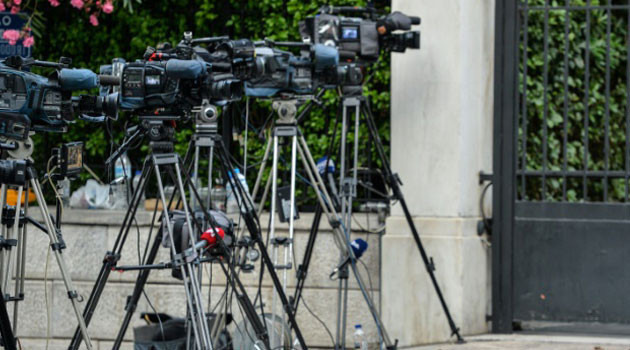
“The media has never been freer,” said government information secretary Ezekiel Mutua. “There is no reason for journalists to fear.”/AFP-File
The report by the Committee to Protect Journalists (CPJ) paints a grim picture of a media industry under siege with journalists “vulnerable to legal harassment, threats, or attack, while news outlets are manipulated by advertisers or politician-owners”.
Compared to neighbouring Somalia, where more than 40 journalists have been killed since 2009, or Ethiopia, where journalists and bloggers are regularly jailed on terrorism charges, Kenya’s assault on the press is more subtle but still worrying.
The CPJ and the Media Council of Kenya, a regulatory body, said there were 19 threats against journalists in the first five months of this year, or “almost one a week”.
One journalist has been murdered this year, with the CPJ saying the April killing of John Kituyi, editor and publisher of the small Mirror Weekly newspaper in Eldoret, was “directly related” to his work as a journalist.
“The deteriorating climate for press freedom comes at a crucial time for continued development of Kenya’s democracy and economy,” the CPJ warned.
Despite passing a new, liberal constitution in 2010, Kenya’s government has since introduced “a series of laws that undermine self-regulation and allow for harsh fines and jail terms for journalists”.
The laws were drafted after President Uhuru Kenyatta was elected in 2013.
At the time both he and his running mate, William Ruto, were indicted by the International Criminal Court (ICC) for crimes against humanity, one of a list of “sensitive topics” identified by the CPJ. The case against Kenyatta has since collapsed, while Ruto’s trial continues.
“This is one of the most hostile regimes we have seen to press freedom,” David Ohito, an editor at Kenya’s Standard Group media company, told CPJ.
– New laws, new pressure –
Ohito said the situation, “is worse than in the single-party era” of the 1980s and 1990s, a notoriously difficult time for journalists.
Investigative reporter John-Allan Namu, who works for KTN television, told AFP the pressure is “subtle… but you can feel it” and warned of an increase in “social media mob justice”.
Political cartoonist Patrick Gathara, whose satirical sketches appear in the Daily Nation newspaper and elsewhere, said, “there is intimidation but the vast majority is simply buying off the press.”
Gathara told AFP he had refused cash for drawings on two occasions and has had some others rejected by editors but, he said, he simply posted the cartoons himself on social media.
Investigative newspaper journalist Daniel Wesangula at The Standard agreed corruption was a problem, both to report on and in determining what gets published.
“Corruption is big in media. Some editors are paid to kill stories,” he said.
Kenya’s government disputed the CPJ findings.
“The media has never been freer,” said government information secretary Ezekiel Mutua. “There is no reason for journalists to fear.”








































